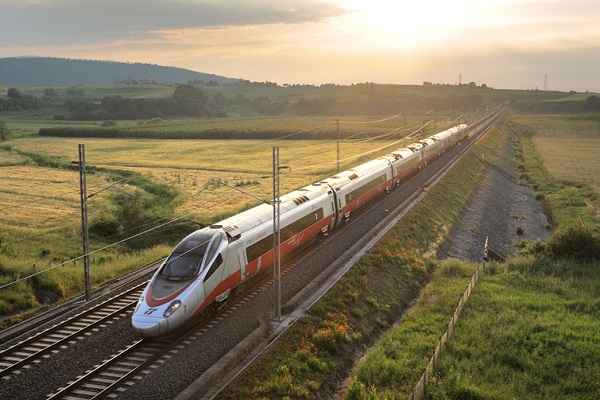 Korail unveils Next-Generation KTX-Cheongryong High-Speed Train
Korail unveils Next-Generation KTX-Cheongryong High-Speed Train Turkey launches new 700 km High-Speed Rail Link connecting Istanbul and Sivas
Turkey launches new 700 km High-Speed Rail Link connecting Istanbul and Sivas Japan agrees to resume stalled Colombo Light Rail Transit project of Sri Lanka
Japan agrees to resume stalled Colombo Light Rail Transit project of Sri Lanka Understanding the Critical Role of Systems Approach in Urban Railway Projects
Understanding the Critical Role of Systems Approach in Urban Railway Projects Exclusive Interview with Ms. Serda Urganciyan, Partner-CEO at Studio 88 Architecture
Exclusive Interview with Ms. Serda Urganciyan, Partner-CEO at Studio 88 Architecture Titagarh Rail Systems set to deliver first sleeper Vande Bharat Train by late 2025
Titagarh Rail Systems set to deliver first sleeper Vande Bharat Train by late 2025 UAE's First Vertiport gets Operational approval, A game-changer in Autonomous Transportation
UAE's First Vertiport gets Operational approval, A game-changer in Autonomous Transportation Nafisah Aslam-Zainudeen: Inspiring the Next Generation of Female Engineers
Nafisah Aslam-Zainudeen: Inspiring the Next Generation of Female Engineers DRA-DMRC JV awarded major contract for redevelopment of Ahmedabad Railway Station
DRA-DMRC JV awarded major contract for redevelopment of Ahmedabad Railway Station Revolutionizing Transportation: Hyperloop Technology in Saudi Arabia
Revolutionizing Transportation: Hyperloop Technology in Saudi Arabia
Feasibility study underway for US$250 Billion Riyadh-Kuwait High Speed Rail Link

Riyadh, Saudi Arabia (Urban Transport News): In a resounding endorsement of the financial, economic, and technical feasibility, Saudi Arabia and Kuwait are set to embark on a transformative journey, connecting Riyadh and Kuwait City through a high-speed train. This ambitious endeavor, a testament to the evolving landscape of sustainable mobility, aims to redefine the regional connectivity between the two nations.
The Saudi Railway Company has entrusted the expertise of Systra, a renowned transport and mobility specialist based in France, to spearhead the feasibility study for this high-speed rail link. Systra, having collaborated with the Saudi railway company in a similar capacity in 2022 for a prospective train connection with Doha, brings a wealth of experience to the table.
The comprehensive consultancy services for the Kuwait Railway Project, comprising three pivotal phases - a comprehensive study, a critical review, and updating conceptual designs - underscore the meticulous planning invested in this initiative. The project's scope extends to the completion of detailed engineering designs, studies, and the preparation of technical documents for bid submission.
The financial commitment for the feasibility study, estimated at $10.5 million, reflects the shared vision of Saudi Arabia and Kuwait in fostering enhanced rail connectivity. This visionary move is a cornerstone of the broader efforts within the Gulf Cooperation Council (GCC) countries to bolster rail infrastructure, facilitating more efficient transportation and trade across the Gulf region.
The proposed high-speed rail link aligns seamlessly with the ongoing Gulf Railway (GCC railway) project, envisaged as a comprehensive rail network spanning 2,177 km and connecting all six GCC member states in Eastern Arabia. The estimated cost of this ambitious high speed rail project conencting Riyadh to Kuwait is US$250 billion. Although the completion date has been delayed beyond the initial 2025 schedule, the Gulf Railway holds immense potential for the region's economic and logistical landscape.
As part of the Gulf Railway, the Riyadh-Kuwait high-speed link is expected to create more than 80,000 direct and indirect jobs, according to Abdulrahim Naqi, Secretary General of the Federation of the GCC Chambers of Commerce and Industry. Beyond job creation, the railway aims to boost intra-GCC trade by providing efficient freight transport services, promoting seamless movement across the GCC.
Saudi Arabia's approval of the railway link aligns with a broader vision of transitioning towards sustainable mobility. The country, traditionally a regional powerhouse in the fossil fuel industry, is actively seeking to diversify its economic portfolio. The proposed high-speed rail link becomes a pivotal component in Saudi Arabia's journey towards sustainability, marking a strategic pivot away from fossil fuels.
The collaborative efforts of Saudi Arabia and Kuwait to pursue the high-speed rail link represent a significant leap towards regional integration and economic growth. The careful consideration given to the feasibility study, the alignment with broader GCC initiatives, and the focus on sustainability collectively signal a transformative era in the Gulf's transportation landscape.




